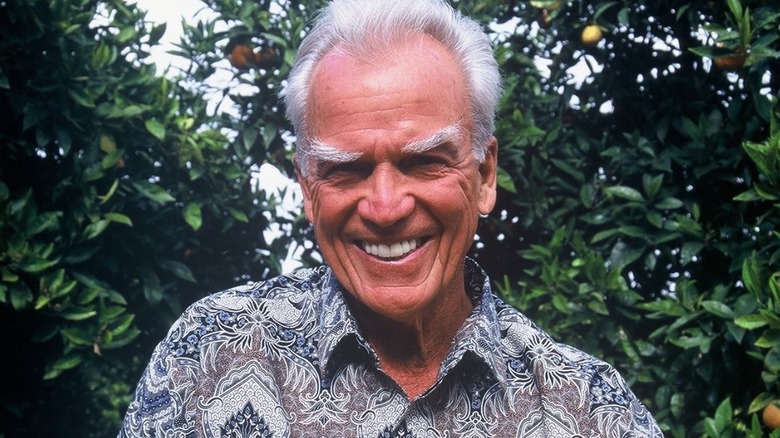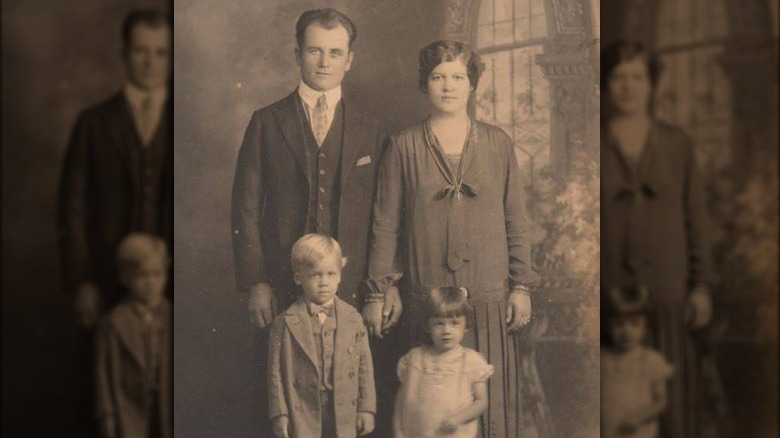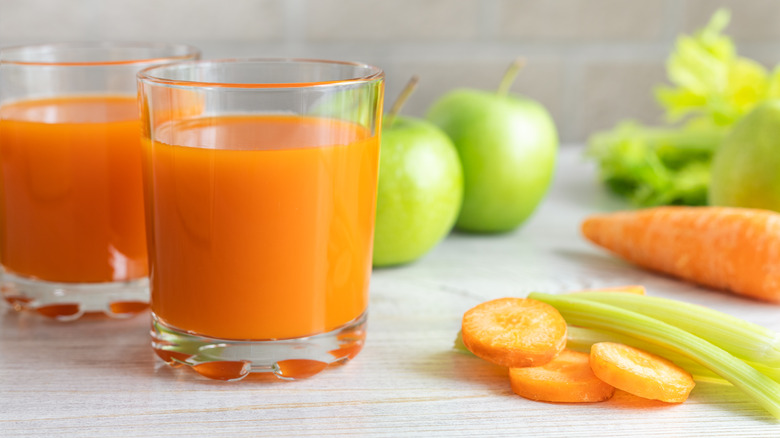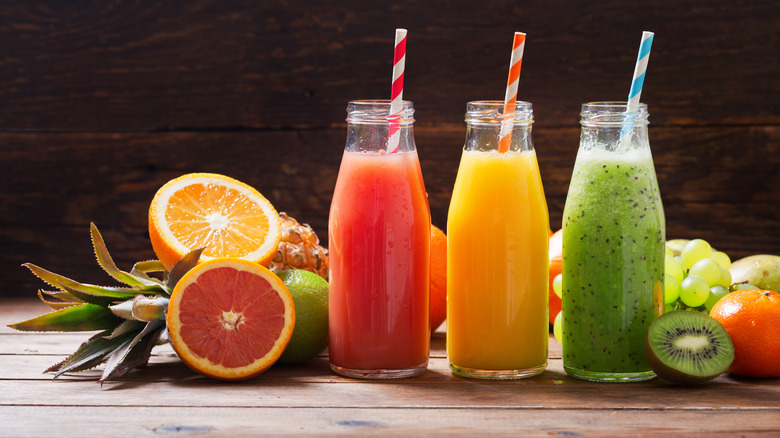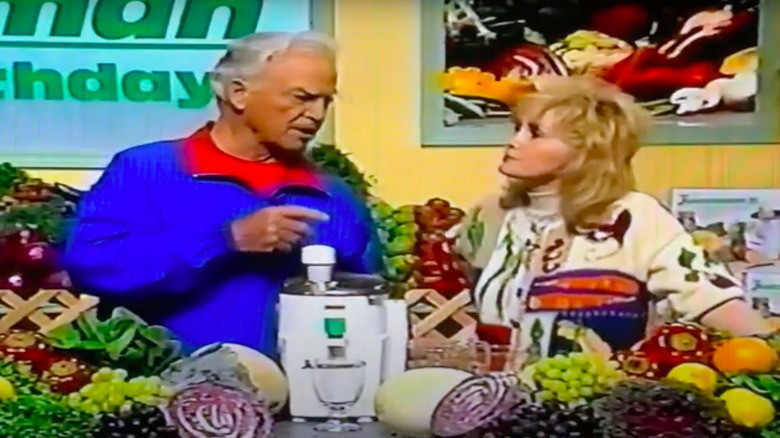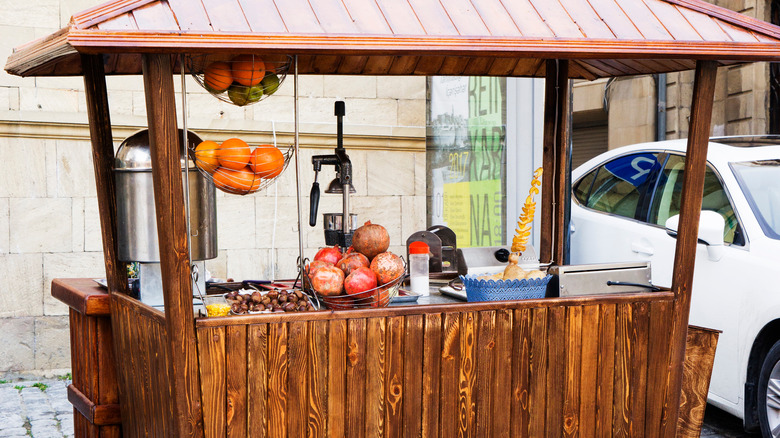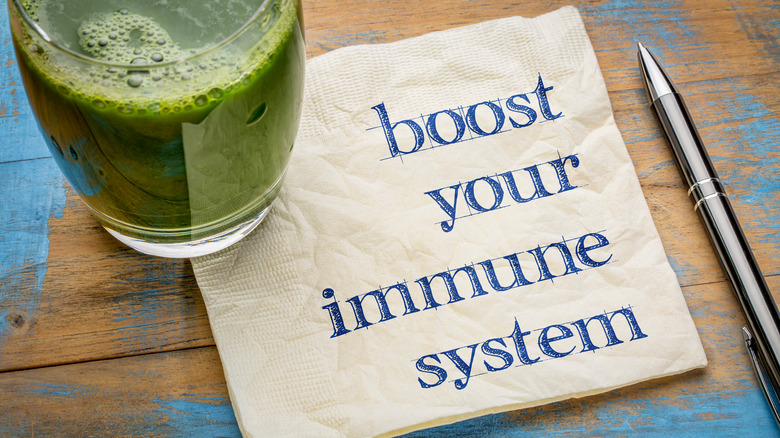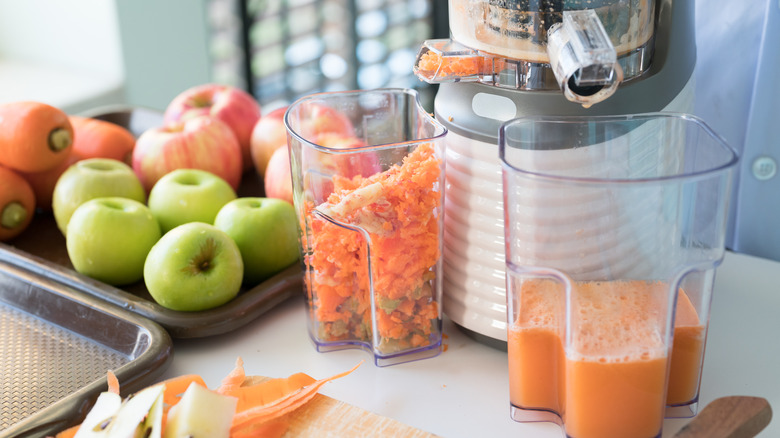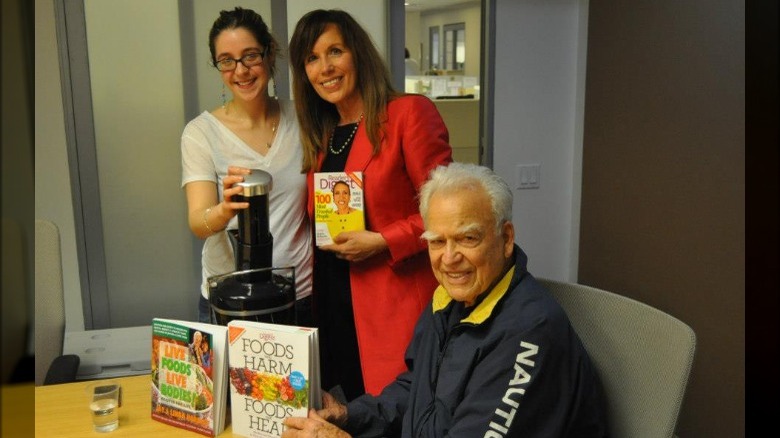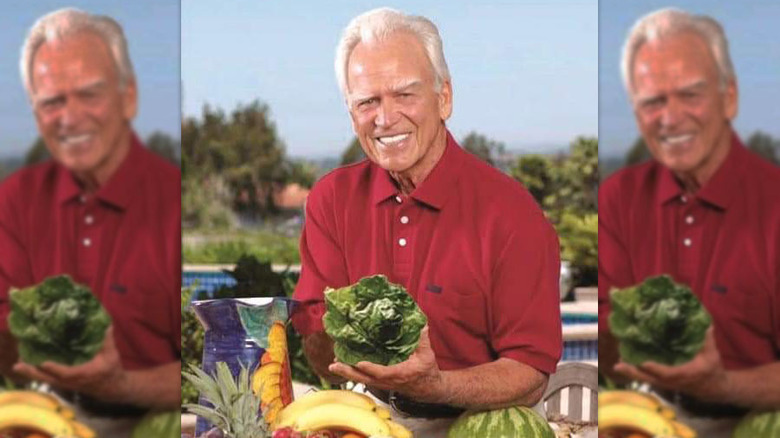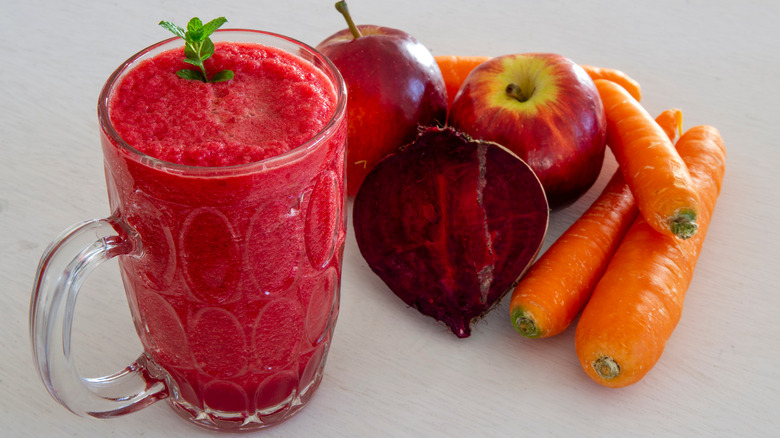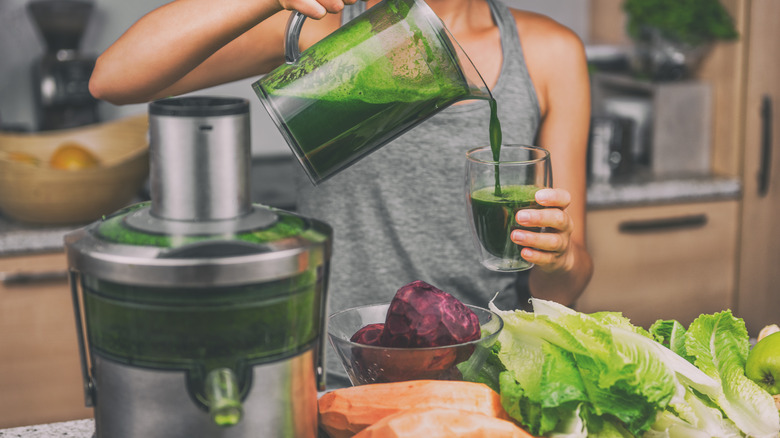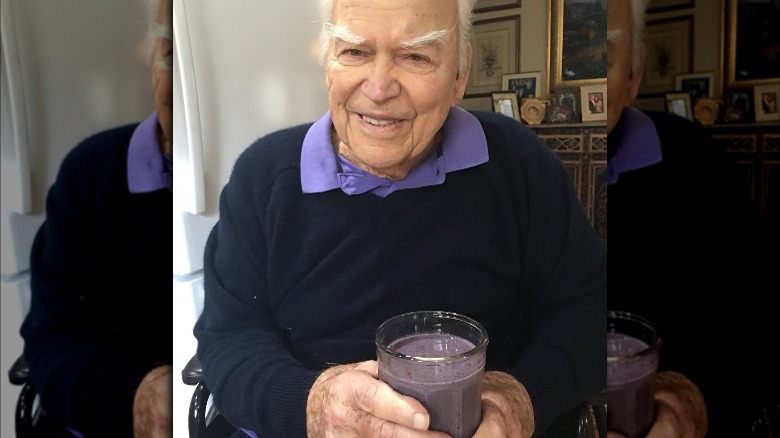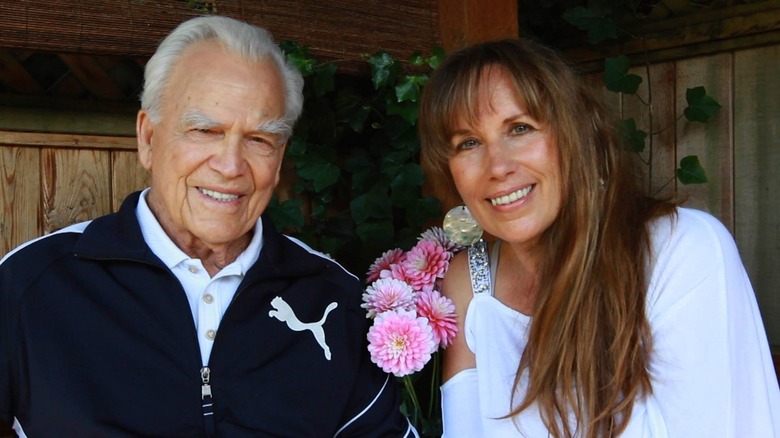The Truth About The Father Of Juicing
John "Jay" Kordich, "The Father of Juicing," earned his nickname after rising to fame for a series of infomercials promoting the Juiceman juicer in the 1990s for JM Marketing. His passion for the concept of juicing — extracting nutrients in liquid form from fruits and vegetables — and his own anecdotal history of the power of the practice, together fueled his abilities as a salesman. In fact, he was recruited by JM Marketing after executives witnessed his sales pitch for juicers at a Seattle trade show in 1988. And after the first infomercial debuted in mid-1991, the product became such a hit that a slew of competitors entered the market and according to the Chicago Tribune, led to the sale of roughly two million extractors in 1991, making it the nation's best-selling small appliance. When you consider other small appliances include household staples like toasters, blenders, and microwaves, that's no small feat.
But the somewhat short-lived success of Kordich's juicing infomercial fame only highlights a small part of the salesman's history. He became an advocate of juicing long before his first infomercial ever hit the small screen, and he continued promoting the practice until he died in 2017. His long-lived passion is a testament to the power of conviction and how it can change the course of a life... and possibly the power of juicing, too.
As a young man he was a star athlete and drafted into the NFL
According to Kordich's own website, he was born in 1923 in southern California where he learned the importance of hard work from his father, a fisherman. He used the lessons learned from his father to invest himself in athletic pursuits, first playing high school football, then playing for the University of Southern California. Of course, football was still in its relative infancy in the 1940s (the NFL was formed in 1920, the first draft was 1936, and the first Super Bowl wasn't until 1967), and World War II was going strong at the time that Kordich was in college.
In an interview he shared that like many other young, strong men of this time, he ended up joining the armed services, serving in the Navy. This gave him the opportunity to continue playing football, and he called sports his "calling card to life." In fact, Kordich was actually drafted into the NFL in 1949 in the 22nd round by the Green Bay Packers. He was 25 at the time, and never ended up playing football professionally due to his own serious health diagnosis, and the diagnosis that would lead to his passion for juicing.
The Father of Juicing was introduced to the concept after being diagnosed with bladder cancer in his 20s
If you're in your 20s, in the 1940s, and you start "peeing blood" as Kordich recounted during a 2013 interview, you're bound to feel pretty stressed out. And for good reason. Kordich found himself facing a terminal bladder cancer diagnosis at a time when cancer research and treatments were limited compared to modern standards. Determined not to go down without a fight, Kordich started doing his own research and came across the findings of Dr. Max Gerson, one of the earliest proponents of juicing.
As he told The Huffington Post, without many other options at his disposal, he ended up traveling to New York from California to spend a month learning from Gerson. His time in New York included a month of juicing, followed by an ongoing prescription of daily juicing, combined with plant-based healthy eating. Gerson's recommendations particularly focused on using carrots and apples, although other fruits and vegetables were also used.
Jay Kordich credited juicing with curing his illness
After practicing his new, healthy eating and juicing lifestyle for two years — according to one Washington Post interview, his juicing routine consisted of a fresh glass of carrot-apple juice every hour, 13 times per day — Kordich was given a clean bill of health. Considering his previous doctor's prognosis was considered "zilch," the newly cancer-free Kordich credited juicing for his cure, transforming his belief system and setting him on a path to become the nation's biggest juicing advocate and proselytizer.
That said, Kordich was always careful about using the word "cure" when referring to juicing. He tended to emphasize the health benefits of the practice as an immune booster and a type of "insurance" to help prevent illness, rather than a way to cure disease. This was probably a wise stance to take, considering the Food and Drug Administration doesn't take kindly to people or companies making unverified health-related claims.
In the 1990s his Juiceman infomercials led to a juicing explosion
Jay Kordich didn't invent juicing — the practice has trended in and out of the health scene several times since the 1970s — but the Father of Juicing certainly deserves to be pegged as the reason for juicing's early popularity in U.S. households. Before Kordich's infomercials for the Juiceman hit the television airwaves in 1991, the concept of juicing was mainly reserved for "health nuts." And even though only four infomercials were ever recorded, and were simply re-played for years on nighttime and weekend cable television, Kordich's smooth sales pitch captured the interest of American consumers. According to an interview Kordich had with The Huffington Post, the Juiceman Juicer alone accrued more than $300 million in sales between 1995 and 2002 — an impressive number that doesn't account for sales of other juicer brands that hit the market during the height of Kordich's infomercial reign.
As with most things, the timing of Kordich's infomercials likely played a role in his success. The late 1980s and early '90s were a key time for an increased interest in healthy living (Jazzercise, Bowflex, the ab wheel, and Tae Bo were other popular health crazes of the time), and Jamba Juice opened its first store in 1990. And as a nationwide interest in health continued to grow, Kordich's early trend-setting likely played a role in the continued interest in juice cleanses, which as of 2016, had grown to a multi-billion dollar industry.
But before his infomercial fame, he was a traveling salesman
The thing to remember about Kordich, though, is that he was never just a hired salesman — he could convincingly sell juicers because of his own lived experience. As such, he dedicated his life to promoting juicing, long before he achieved infomercial fame.
According to an article in the Tampa Bay Times, Kordich began selling juicers as a traveling salesman shortly after his own health crisis was averted. In his own words to the newspaper, he "followed the sun," going where he needed to go to pitch his wares and make ends meet. That meant that some days he could be found behind the counter of a custom-made booth at a shopping center in Florida, while other days he might be found hawking wares at a health fair in Seattle. And it was his sales pitch in Seattle that caught the eye of the executives at JM Marketing who would ultimately become his business partners, putting his name, and juicing, on the map in a big way.
He made a lot of wild health claims
The thing to keep in mind about Kordich (and juicing) is it's easy to mix up scientifically-backed facts about the importance of consuming fruits and vegetables, and the pseudo-science of the powers of juicing. There's no denying that the scientific community, along with major health organizations like the American Heart Association and American Cancer Society, have good reason to suggest people consume a largely plant-based diet full of fresh fruits and vegetables. The health benefits are many: fruits and vegetables are filled with vitamins, minerals, fiber, and even water content, all of which help bolster the body's systems, including the immune and digestive systems. Not to mention, fruits and vegetables tend to be low in fat and calorie content, helping you fill up on good-for-you foods without over-eating.
When someone like Kordich comes along, promoting the increased intake of fruits and veggies while trying to sell a tool to do it, it's important to be on the lookout for "extra" claims that lack scientific evidence. For instance, Kordich made waves when he claimed that "parsley gets you high," which, of course, it doesn't. But some of his other claims about juicing, like it being a better way for the body to get nutrients, aren't backed by actual science, as pointed out by Quack Watch. If juicing helps you consume your fruits and veggies, there's nothing wrong with imbibing, but there's no evidence that juicing is better for you than eating them whole.
After making a name for himself, Jay Kordich lost the trademark for the Juiceman
As with most big successes, there come unexpected trials and challenges. In what likely started as a fruitful-looking business deal, Jay Kordich, and his wife Linda, decided to sell the Juiceman name to Salton, Inc. in 1994 for $3 million. Salton also owned the George Foreman Grill, and certainly, $3 million is nothing to scoff at. The problem? Kordich and his wife lost the rights to use the Juiceman trademark — the trademark Kordich had personally owned and built his name and brand around since 1948.
In a 2006 press release announcing Kordich's "comeback" after this legal debacle, the Father of Juicing lamented feeling robbed of his personality and his ability to teach, feeling handcuffed and forced into retirement for 13 years. While he used his time in legal limbo to continue as a "goodwill ambassador" for juicing, he was more or less out of the game until he decided to release more books and work on developing a new juicer in his 80s and 90s with the help of his wife.
Even after losing the trademark, he continued promoting juicing as his lifelong pursuit
When you feel called to preach about a particular lifestyle, you're not going to let unfortunate circumstances stop you from doing the work you feel called to do. Even after selling his Juiceman trademark and company interests to Salton, Inc., Kordich didn't stop promoting juicing. He functioned as a "goodwill ambassador" for juicing, selling books and online products through his own website. And in 2016, at the age of 89, according to a Huffington Post article, he and his wife Linda started promoting a new juicing machine, the PowerGrind Pro.
The thing is, despite (or because of), Kordich's lifelong role as a salesman, his passion for juicing made his sales pitch seem natural. In fact, according to a 1991 article in the Washington Post, Don Oldenburg pointed out, "The second hardest thing to remember when talking to Kordich is that he's a salesman. A brilliant salesman. So good that he doesn't even talk much about the product he's selling." So really, Kordich's continued involvement as a juicing promoter certainly helped him continue to earn a living, but more than anything, it was a natural outpouring of his own passion that just couldn't be contained.
Jay Kordich practiced what he preached
Jay Kordich was never a man of few words. Whether talking to reporters or making his juicing pitch on infomercials, Kordich could talk the talk because he walked the walk. And his own walk started when he switched from a standard American diet to one filled with daily juicing. In an interview with the Tampa Bay Times, he recounted that before his 1948 bladder cancer diagnosis, he filled his diet with junk food, including his favorite breakfast, pork chops and eggs.
But in an effort to save his own life, he transformed his eating habits, began his regimen of daily juicing, and ditched the junk food forever. His sales pitch for juicing could hold the ring of truth because everything he promoted was true to him and his own experiences. While he told the Washington Post that he knew most people would never give up junk food completely, his hope was that most people would supplement the standard American diet with juicing as a means to help safeguard their health.
Jay Kordich's go-to juices tended to include apples, carrots, and beets
Considering that Kordich made juicing a part of his daily lifestyle for upwards of 60 years, you know he tried practically every possible combination of fruits and vegetables. With many of his own books full of juicing recipes, it's interesting to note that even he has go-to favorites. He told the Tampa Bay Times that there were four recipes, in particular, that he especially enjoyed. Specifically, a juice for boosting energy, which was a mix of beets, carrots, apples, lemon, and ginger; a juice he termed "the digestive special," including spinach and carrots; the "liver mover," including apples and beets, and the "passion cocktail," including strawberries and an apple.
It's not a huge surprise that many of his favorite juices include beets, carrots, and apples. His original cancer "curing" regimen included juices with the same ingredients, so it makes sense that these fruits and veggies would continue being go-to favorites. Just remember, the names of his juices, while eye-catching, aren't scientifically based. So a title like the "liver mover" doesn't necessarily mean that the juice is helping the liver do its job. And while the "digestive special" may be filled with good-for-you nutrients, it lacks the fiber that would likely get the digestive tract moving. These are all tied more to marketing and sales than actual bonafide health claims.
He launched another juicer in 2011 to reignite his juicer fame
Kordich needed to take a moment to grapple with the reality of the loss of his trademark and the use of the name "Juiceman." It's understandable — when you've built your career around a particular name, losing it, and the recognition factor that comes with it, is bound to hit hard. But in 2011, Kordich and his wife, Linda, decided to put that heartbreak behind them and return to the business of selling juicers.
In a 2011 press release, the Kordiches announced the launch of their Jay Kordich PowerGrind Pro, which Kordich himself proclaimed to be the "best juicer I have ever helped design." And with six international patents and the ability to juice and blend, it certainly seemed like a good addition to the market. That said, as of 2021, the juicer is no longer available through the Jay Kordich website, although a different juicer and a high-end blender can be purchased. It's unclear what happened to the PowerGrind Pro, but its longevity was certainly less than that of the original Juiceman.
Jay Kordich died in 2017 at the age of 93 and disease free, too
Even daily juicing can't stop the realities of life and death, and in 2017, at the ripe old age of 93, Kordich passed away. Kordich's wife, Linda, reported the circumstances of his death in a Facebook post the day that he died. In the post, Linda reported that Kordich simply woke up and experienced some breathing problems, then passed peacefully away. There was no reported underlying condition or illness that contributed to his death, other than simply old age.
And it's important to note that Linda also recounted how vibrant and wonderful he was even on the day he died. It's a testament to the power of healthy living — you may never be able to escape death itself, but you have a better shot at living well for the totality of the days you're given. And according to his wife, Kordich kept living passionately and kindly until his very last breath. Can that all be chalked up to juicing? Probably not entirely, but it's impossible to say for sure. If juicing and healthy eating helped give Kordich's body the nutrients he needed to fight cellular damage and preserve his active lifestyle, then juicing may well have helped give him his 93 years.
Kordich's widow, Linda Kordich, continues his juicing legacy online
Kordich and his wife, Linda, were married for 36 years, which included his rise to fame as an infomercial star. As such, Linda was intimately involved in his business, and was co-author of several books and partner on numerous juice-related business ventures. While the websites and products they launched always bore Jay's name, Linda didn't sit idly by. This put her in a position to continue Kordich's juicing empire even following his death. Linda has remarried, but continues to maintain the Jay Kordich website, selling books, instructional videos, and juicing-related products. She also posts to Kordich's original social media pages with new promotions. Her most recent promotion was released in December 2020 and features a free, seven-day healthy living challenge. While she may be bridging Jay's previous empire into something entirely her own, she clearly continues to honor Kordich's passion with her own ventures and dedication to his previous businesses.
